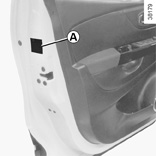TYRE PRESSURE
 |
Label A
Open the driver’s door to read it.
Tyre pressures should be checked when the tyres are cold.
If the tyre pressures cannot be checked when the tyres are cold, increase the pressures from 0.2 to 0.3 bar (or 3 PSI). Never deflate a hot tyre.
Vehicle fitted with a tyre pressure loss warning system
If under-inflated (puncture, low pressure, etc.), the warning light on the instrument panel comes on. See “Tyre pressure loss warning” in chapter 2.
|
 |
B: dimension of the tyres fitted to the vehicle.
C: intended driving speed. D : recommended pressure for optimising fuel consumption. NB: driving comfort may be altered. E: front tyre pressure. F: rear tyre pressure. G: tyre pressure for the emergency spare wheel.
|
Special note concerning fully laden vehicles (Maximum Permissible All-Up Weight) and towing a trailer: the maximum speed must be limited to 60 mph (100 km/h) and the tyre pressure increased by 0.2 bar.
Please refer to the information on “Weights” in Section 6.
Tyre safety and use of snow chains: Refer to the information on “Tyres” in Section 5 for the servicing conditions and, depending on the version, the use of chains.
For your safety, please respect the speed limit.
When they need to be replaced, only tyres of the same make, size, type and profile should be used on a single axle.
They must: either have a load capacity and speed rating at least equal to those of the original tyres, or conform to those recommended by an authorised dealer.
Failure to heed these instructions could endanger your safety and affect your vehicle’s roadworthiness.
Risk of loss of control of the vehicle.